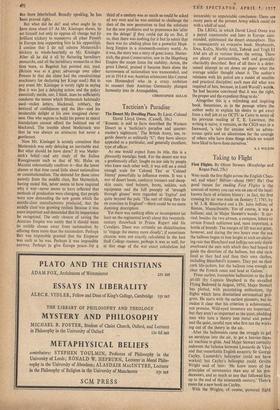Tactician's Paradise
ROMMEL is said to have described the Western Desert as a 'tactician's paradise and quarter- master's nightmare.' The British Army, too, re- gards deserts as militarily 'U'; they have always appealed to a particular, and generally excellent, type of officer.
As one would expect from its title, this is a pleasantly nostalgic book. For the desert war was a gentlemanly affair, fought on our side by people who knew each other well; it was still on a small enough scale for 'Colonel Tim' or 'Colonel Jimmy' powerfully to influence events. It was a war of desert boots, corduroy trousers and sheep- skin coats; steel helmets, boots, anklets, web equipment and the full panoply of 'strength through gloom' were regarded as ltiglesi' and quite beyond the pale. 'The sort of thing they do on exercises in England'—there could be no more damning description.
Yet there was nothing effete or incompetent (at least on the regimental level) about this twentieth- century throwback to Prince Rupert and his Cavaliers. There was certainly no disinclination to 'engage the enemy more closely'; if sometimes chances were not exactly calculated in the best Staff College manner, perhaps it was as well, for at that stage of the war exact calculation led inexorably to unpalatable conclusion. There are many parts of the present Army which could do with a whiff of sand.
The LRDG, in which David Lloyd Owen was a patrol commander and later in Europe com- manded, epitomised the desert atmosphere. This is consequently an evocative book. Shepheards, Siwa, Kufra, Marble Arch, Tobruk and Trigh El Abd are all at various times the setting. There are plenty of personalities, well and generally charitably described. Best of all there is a deter- mined attempt to set down on paper what the average soldier thought about it. The author's relations with his patrol are a model of sensible and practical discipline; each man did what was required of him, because, in Lord Wavell's words, 'he had become convinced that it was the right, the proper and the expedient thing to do.'
Altogether this is a refreshing and inspiring book. Sometimes, as in the passage where the author seeks to explain his desire to get away from a dull job at an OCTU in Cairo in terms of his previous reading of T. B. Lawrence, the writing is naive; it remains, as the CIGS says in a foreword, 'a tale for anyone with an adven- turous spirit and an admiration for the courage of others who have done things which we would have liked to have done ourselves.'
A. J. WILSON












































 Previous page
Previous page